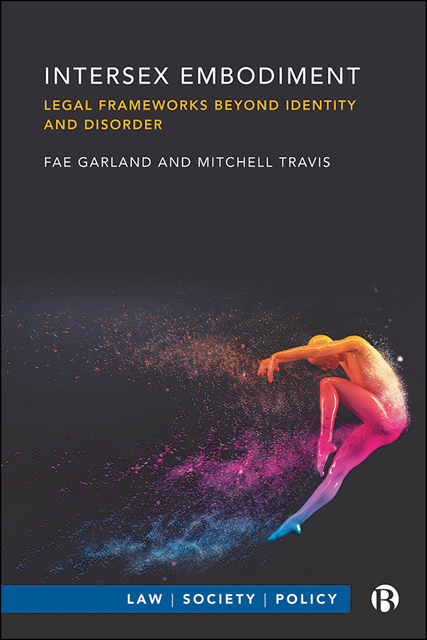Book contents
- Frontmatter
- Dedication
- Contents
- Series Editor’s Preface
- List of Abbreviations
- Acknowledgements
- 1 Introduction: Embodying Intersex
- 2 Medical Embodiment: Intersex as Disorder
- 3 Non-Binary Embodiment: Intersex and Third-Gender Markers
- 4 LGBT Embodiment: Queerness, Homonormativity and Anti-Discrimination Law
- 5 Engaging with Intersex Experience: Can Law Disrupt Medical Embodiment?
- 6 Intersex as Acceptance and Emergence: Can Psychosocial Frameworks Disrupt Medical Embodiment?
- 7 Conclusion: Intersex Embodiment
- References
- Index
2 - Medical Embodiment: Intersex as Disorder
Published online by Cambridge University Press: 17 June 2023
- Frontmatter
- Dedication
- Contents
- Series Editor’s Preface
- List of Abbreviations
- Acknowledgements
- 1 Introduction: Embodying Intersex
- 2 Medical Embodiment: Intersex as Disorder
- 3 Non-Binary Embodiment: Intersex and Third-Gender Markers
- 4 LGBT Embodiment: Queerness, Homonormativity and Anti-Discrimination Law
- 5 Engaging with Intersex Experience: Can Law Disrupt Medical Embodiment?
- 6 Intersex as Acceptance and Emergence: Can Psychosocial Frameworks Disrupt Medical Embodiment?
- 7 Conclusion: Intersex Embodiment
- References
- Index
Summary
Introduction
Accounts of legal embodiment are impoverished if they do not explore the ways in which other institutions contribute to our understanding of bodies. In the case of intersex embodiment, medicine is crucial for understanding how intersex people have been framed – indeed, and as we shall outline, medical accounts offer the paradigmatic account of intersex embodiment. Medicine investigates and explores the materiality of the body and presents its results as objective and value free. However, medicine’s reporting back of this materiality is not neutral and is always, itself, immured in culture (Butler, 1993; Fausto-Sterling, 2000). Part of the importance of medicine’s contribution to embodiment has been its ability to establish itself as the primary way through which we must understand the body. Medicine sets the discursive framing of the subject and constructs the parameters of laws engagement (Travis, 2015, 2019; Dietz, 2018; Garland and Travis, 2020a).
As noted in the previous chapter embodiment is a multifaceted concept. Nonetheless, the most prevalent construction of intersex embodiment is that of disorder. The medical profession has been instrumental in the determination of how intersex embodiment is understood and, consequently, how it ought to be managed. Most notably, this framing of intersex embodiment has presented intersex variations as in need of ‘fixing’ and accordingly justified the use of early non-therapeutic surgical and hormonal interventions before intersex people can meaningfully consent, delimiting the presence of law as unnecessary in this area. In recent years, an increasing number of intersex rights advocates and international bodies have sought to challenge this medical framing, contending that it unnecessarily and problematically pathologizes intersex people and their experiences. However, efforts have thus far been largely unsuccessful and, despite international condemnation from the UN (Garland et al, 2022), the disorder narrative of intersex embodiment prevails within contemporary medical practice and wider society. The power and influence of the medical profession has meant that their authority to determine what intersex is has, for the most part, gone legally and politically unchallenged.
This chapter examines what it means to understand intersex embodiment through a lens of disorder and how this view has developed over time. Given that our interviews focused on contemporary legal approaches post 2013, very few of our respondents from both our SLSA and British Academy projects reflected on the way in which medical approaches towards intersex embodiment developed over time.
- Type
- Chapter
- Information
- Intersex EmbodimentLegal Frameworks beyond Identity and Disorder, pp. 24 - 50Publisher: Bristol University PressPrint publication year: 2022



